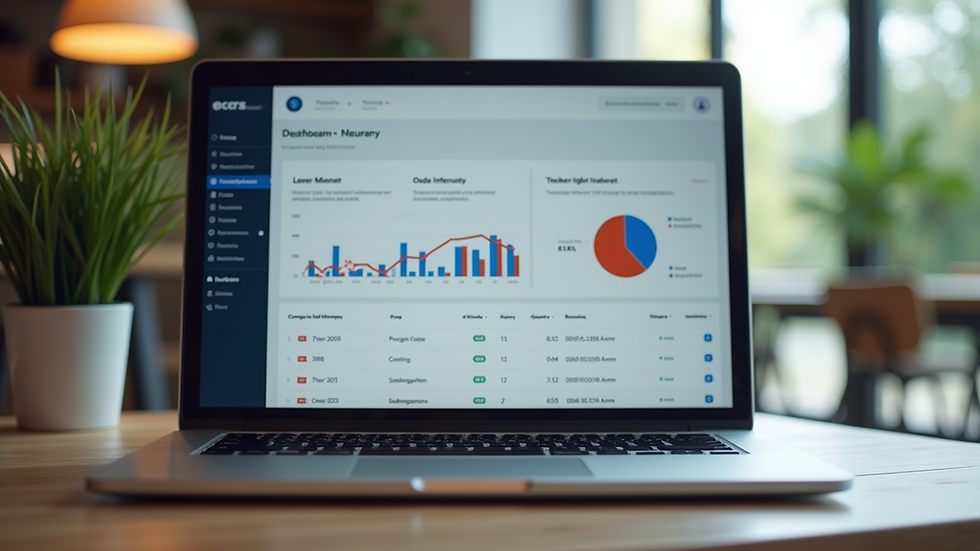The Crucial Role of SEO in Website Success
- Mayuresh Pande
- Aug 20, 2025
- 5 min read
When I first started working with websites, I quickly realized that having a beautiful design and great content was not enough. Without proper visibility, even the best websites can go unnoticed. This is where SEO, or Search Engine Optimization, plays a vital role. SEO is the key to making your website stand out in the crowded online world. It helps your site rank higher on search engines like Google, which means more visitors, more engagement, and ultimately, more success.
In this post, I want to share why SEO is important, how it works, and what you can do to improve your website’s performance. Whether you are new to SEO or looking to sharpen your skills, this guide will provide clear, practical advice to help you succeed.
Why SEO is Important for Your Website
SEO is important because it connects your website with the people who are actively searching for what you offer. Imagine you have a small business selling handmade candles. If your website doesn’t appear on the first page of search results when someone types “handmade candles,” you are missing out on potential customers.
Search engines use complex algorithms to decide which websites to show first. They look for relevance, quality, and user experience. SEO helps you meet these criteria by optimizing your content, structure, and technical setup. This means your site becomes more attractive to search engines and easier for users to navigate.
Here are some key reasons why SEO matters:
Increased Visibility: Higher rankings mean more people see your website.
Targeted Traffic: SEO attracts visitors who are interested in your products or services.
Cost-Effective Marketing: Unlike paid ads, organic traffic from SEO is free.
Builds Credibility: Websites that rank well are often seen as more trustworthy.
Better User Experience: SEO encourages clean, fast, and mobile-friendly sites.
By understanding and applying SEO, you can turn your website into a powerful tool for growth. If you want to dive deeper into the importance of SEO, this resource offers excellent insights and strategies.

How SEO Works: The Basics You Should Know
SEO might seem complicated at first, but it boils down to a few simple principles. Search engines like Google use bots to crawl websites, index their content, and rank them based on relevance and quality. Your goal is to make your website easy for these bots to understand and valuable for users.
Here are the main components of SEO:
Keyword Research: Finding the right words and phrases your audience uses to search.
On-Page SEO: Optimizing your content, titles, headings, and images to include keywords naturally.
Technical SEO: Ensuring your website loads quickly, is mobile-friendly, and has a clear structure.
Off-Page SEO: Building backlinks from other reputable websites to boost your site’s authority.
For example, if you run a blog about healthy recipes, you want to use keywords like “easy healthy meals” or “quick nutritious recipes.” Then, you create content around these topics, optimize your headings, and add descriptive alt text to images.
Technical SEO might involve improving your site speed by compressing images or using a reliable hosting service. Off-page SEO could mean reaching out to food bloggers for guest posts or collaborations.
By focusing on these areas, you help search engines find, understand, and trust your website. This leads to better rankings and more visitors.

What are the 4 Pillars of SEO?
To build a strong SEO strategy, it helps to understand the four main pillars that support it. These pillars work together to improve your website’s search engine ranking and user experience.
1. Technical SEO
This pillar focuses on the backend of your website. It includes site speed, mobile optimization, secure connections (HTTPS), and proper indexing. If your site is slow or hard to navigate, visitors will leave quickly, and search engines will rank you lower.
2. On-Page SEO
On-page SEO is about optimizing the content on your website. This means using relevant keywords in titles, headings, and throughout the text. It also involves writing clear meta descriptions and using alt text for images. Good on-page SEO makes your content easy to read and understand.
3. Off-Page SEO
Off-page SEO refers to actions taken outside your website to improve its authority. The most common method is building backlinks from other trusted sites. Social media sharing and online reviews also contribute to off-page SEO.
4. Content
Content is the heart of SEO. High-quality, original, and useful content attracts visitors and encourages them to stay longer. It also increases the chances of other websites linking to you. Content should be regularly updated to stay relevant.
By focusing on these four pillars, you create a balanced SEO strategy that covers all important aspects. This approach helps your website perform well in search results and provides a great experience for visitors.

Practical Tips to Improve Your SEO Today
Improving your SEO doesn’t have to be overwhelming. You can start with small, manageable steps that make a big difference over time. Here are some practical tips you can apply right now:
Use Clear Titles and Headings: Make sure your page titles and headings include your main keywords. This helps search engines understand your content.
Optimize Images: Use descriptive alt text for every image. Compress images to improve loading speed.
Create Quality Content: Write content that answers your audience’s questions. Use simple language and break text into short paragraphs.
Improve Site Speed: Test your website speed using tools like Google PageSpeed Insights. Fix issues like large images or slow server response.
Make Your Site Mobile-Friendly: Ensure your website looks good and works well on smartphones and tablets.
Build Backlinks: Reach out to related websites for guest posts or collaborations. Share your content on social media.
Use Internal Links: Link to other pages on your website to keep visitors engaged and help search engines crawl your site.
Remember, SEO is a long-term effort. Consistency and patience are key. Track your progress with tools like Google Analytics and adjust your strategy based on what works best.
Moving Forward with SEO Confidence
SEO is not just a technical task; it’s a way to connect with your audience and grow your online presence. By understanding why SEO is important and how it works, you can make informed decisions that benefit your website.
Whether you are building a new site or improving an existing one, focusing on SEO will help you attract more visitors and achieve your goals. Keep learning, experimenting, and adapting your strategy. The digital world is always changing, but the fundamentals of SEO remain strong.
If you want to explore more about the importance of SEO, I recommend checking out expert resources and staying updated with the latest trends.
With the right approach, your website can become a powerful asset that drives success for years to come. Start today, and watch your online presence grow.





Comments